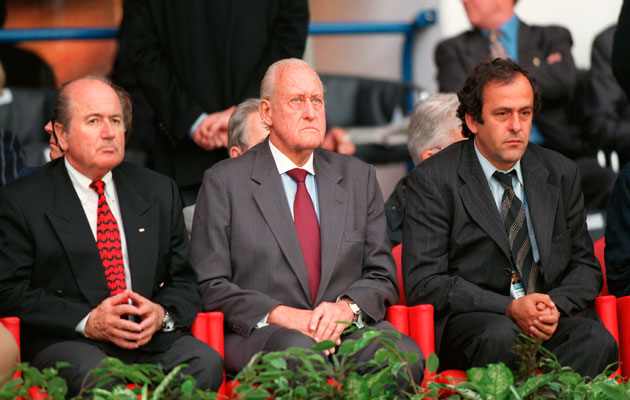Michel Platini has revealed, remarkably, how Joao Havelange had originally wanted him and not Sepp Blatter to succeed the veteran Brazilian as FIFA president.
Frenchman Platini, now leader of European federation UEFA, tells the tale in his new book Parlons Football, a series of thematic interviews with veteran sports journalist Gerard Ernault.*
Platini’s reflection on his rise from player to coach to politician also describes a betrayal by Lennart Johansson over the UEFA presidency and aims gently caustic comments at colleagues within both FIFA’s executive committee and its administration.
One of Platini’s specific charges concerns UEFA’s failure, under Johansson, to avert the Bosman Judgment which he considers hugely damaging to the balance and social fabric of the game.
However his most intriguing comments, considering the current power games at the pinnacle of international football, concern his rise within not only UEFA but world federation FIFA.
As head of UEFA since 2007, Platini is automatically a vice-president of FIFA. He might have been even higher than that.
Platini, in 1998, was joint president of the French local organising committee of the World Cup finals. In the January, he says, FIFA general secretary Sepp Blatter came to him with a proposal from Havelange, who had announced his impending retirement as president.
“Platini [as] president with you [continuing] as general secretary,” were Havelange’s words. “That would be very elegant.”
Blatter had his own eyes on the presidency but knew Havelange’s support against the rival candidacy of then UEFA president Johansson would be crucial. He could not afford to aver. In fact, Platini came to his aid by deciding the FIFA presidency was then a step too far.
Platini says: “It would not have been very practical. For one thing, in January 1998 I had the weight of the World Cup ‘on my arm’ but, above all, I didn’t feel ready to take on such responsibility.
“Blatter . . . said: ‘In that case I will stand. But I need your support.”
In the event Blatter, with Platini’s support, defeated Johansson in an election which remains tainted by allegations of illicit payments made by other supporters for their own ends.
Platini, once the World Cup dust had settled, was free to take up an appointment as ‘counsellor’ to Blatter at FIFA and create the unified international calendar. Soon he developed political ambitions of his own.
He says: “In 2002 I felt ready to stand for UEFA when Lennart Johansson took me on one side and said: ‘Michel, let’s not go to war. Leave me another two years then I’ll pass the baton and support you [for the presidency].”
Comparing events and men in 1998 and 2002, Platini reflects: “Havelange seemed sincere . . . certainly far more than Johansson.
“Johansson did not stay for just two years. He stayed for another five years, having found the strength not only not to honour his word but to have his mandate extended by an extra year until 2007.”
In fact, Johansson served a five-year term because UEFA decided to fall into line with FIFA and shift its election congress to the year following a World Cup. Hence in 1997, rather than effecting a smooth handover, Platini had to fight to oust Johansson from the presidency.
Though speculation swirled about the presidential ambitions of Germany’s Franz Beckenbauer, Platini says: “I don’t think it ever really appealed to Franz.”
Platini outlines his desire to change the underlying philophy of UEFA from “take, take, take” to “give and, at least, share” with federations, leagues and clubs.
As for FIFA he describes Havelange as having established the ‘presidential’ style and command which Blatter had emulated. But, as Platini has made clear over the past year, he opposes Blatter’s desire to cling to power.
Platini says: “I am not his enemy. Blatter has been in FIFA for 40 years and you have to acknowledge the vast amount he has accomplished [but his] FIFA often runs like an electoral machine set up to ensure the continuance of one man.
“After a certain disconnection from reality – or before it, I’m not sure which – it’’s his principal characteristic.”
* Parlons Football: Michel Platini interviewed by Gerard Ernault (Hugo & Cie, Paris).







